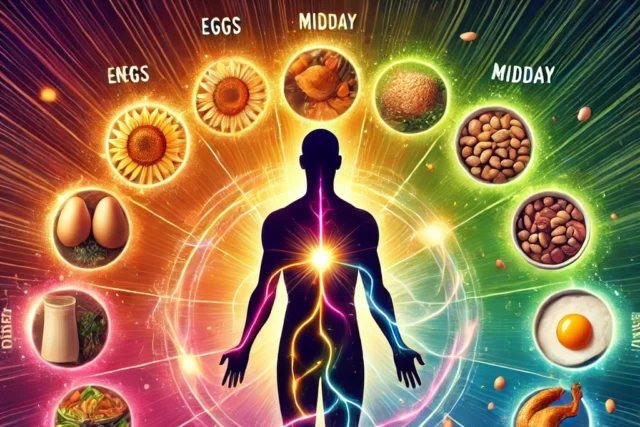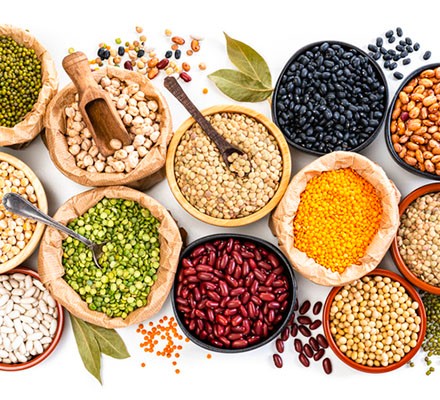When it comes to maintaining energy throughout the day, most people immediately think of caffeine, sugary snacks, or carb-heavy meals. However, the real hero in sustaining energy levels often gets overlooked: protein. This macronutrient, vital for virtually every function in your body, has a profound impact on your physical and mental stamina. From balancing blood sugar to promoting muscle health, protein plays a key role in keeping you energized from morning to night.
In this comprehensive guide, we’ll explore how protein contributes to energy levels, its biological mechanisms, the best sources, and tips on incorporating it into your diet for maximum impact.
Table of Contents
Understanding Energy: What Fuels Your Body?
Before diving into the specifics of protein, it’s essential to understand how your body generates energy. Energy is produced through the breakdown of macronutrients—carbohydrates, fats, and protein—into smaller molecules. These molecules are then converted into adenosine triphosphate (ATP), the body’s primary energy currency.

- Carbohydrates provide quick energy but can lead to spikes and crashes.
- Fats offer a long-term, slower release of energy.
- Protein primarily serves as a building block for tissues but plays a significant role in maintaining steady energy levels.
Unlike carbohydrates and fats, protein doesn’t serve as a primary energy source during rest or low-intensity activities. However, its indirect contributions to energy are critical and long-lasting.
How Protein Impacts Energy Levels
Protein’s effect on energy isn’t about instant gratification—it’s about stability and endurance. Here’s how:
1. Stabilizes Blood Sugar Levels
One of protein’s most significant benefits is its ability to regulate blood sugar. High-carbohydrate meals can cause rapid spikes in blood glucose, followed by sharp drops, leading to fatigue. Protein slows the absorption of glucose into the bloodstream, preventing these energy crashes.
For instance, pairing a carbohydrate source like whole-grain bread with a protein source like peanut butter ensures a steady release of glucose, keeping your energy levels consistent.
2. Provides Sustained Satiety
Feeling full and satisfied after a meal isn’t just about avoiding hunger—it’s also about maintaining energy. Protein has a high satiety factor, meaning it keeps you full for longer. When you’re satiated, your body avoids unnecessary energy dips caused by hunger pangs or overeating.
3. Supports Muscle Repair and Recovery
Protein is essential for muscle health, which directly influences your energy output. Muscles are responsible for all your physical activities, from walking to lifting heavy objects. When muscles are well-fed with protein, they recover faster and remain resilient, preventing fatigue during physical exertion.
4. Supplies Essential Amino Acids
Proteins are broken down into amino acids, the building blocks of life. Certain amino acids, like tyrosine and phenylalanine, play a role in producing neurotransmitters such as dopamine and norepinephrine, which help regulate alertness and focus.
5. Enhances Metabolic Efficiency
Protein requires more energy to digest compared to carbohydrates and fats. This thermic effect of food (TEF) not only boosts your metabolism but also ensures that the energy derived from protein is utilized efficiently, avoiding storage as fat.
6. Prevents Energy Crashes During Workouts
For active individuals, protein is particularly important. It supports endurance by preventing the breakdown of muscle tissue during prolonged physical activity. Incorporating protein into pre- and post-workout meals can make a significant difference in sustaining energy levels.
Protein Timing: When to Eat for Maximum Energy

The timing of protein intake is crucial for maintaining energy throughout the day. Let’s break down an ideal schedule:
1. Morning: Kickstart Your Day
Breakfast sets the tone for your energy levels. Including protein in your morning meal helps stabilize blood sugar after a night of fasting and provides a steady energy release.
- Examples: Eggs and avocado toast, Greek yogurt with berries, or a protein smoothie with spinach and almond butter.
2. Mid-Morning: Snack Smarter
A protein-rich snack can curb mid-morning cravings and keep your energy levels consistent until lunch.
- Examples: A handful of nuts, a boiled egg, or a protein bar.
3. Lunchtime: Fuel for the Afternoon
Lunch should include lean proteins alongside healthy carbs and fats. This combination ensures you remain energized for the second half of the day.
- Examples: Grilled chicken salad, quinoa with roasted vegetables and tofu, or a turkey and avocado wrap.
4. Afternoon Snack: Beat the Energy Slump
An afternoon snack with protein helps you combat the post-lunch energy dip.
- Examples: Cottage cheese with fruit, hummus with carrot sticks, or a handful of trail mix.
5. Dinner: Repair and Replenish
Dinner should focus on lighter protein sources to promote recovery and prepare your body for restful sleep.
- Examples: Grilled salmon with steamed vegetables, lentil soup, or baked chicken with sweet potato.
6. Pre-Bedtime: Optional Nightcap
For those who experience nighttime cravings, a small protein-rich snack can stabilize blood sugar levels overnight.
- Examples: A glass of warm milk, a small serving of Greek yogurt, or a slice of cheese.
Best Sources of Protein for Sustained Energy

Not all proteins are created equal. The quality and source of protein matter when it comes to maximizing energy. Here are the best options:
Animal-Based Proteins
- Eggs: A complete protein that’s easy to digest and versatile.
- Chicken and Turkey: Lean meats with high protein content and low fat.
- Fish: Rich in omega-3 fatty acids and protein, ideal for brain and body energy.
- Dairy: Greek yogurt, cottage cheese, and milk offer protein with additional calcium.
Plant-Based Proteins
- Lentils and Beans: High in fiber and protein, perfect for vegetarians and vegans.
- Tofu and Tempeh: Soy-based proteins that are versatile and nutrient-dense.
- Quinoa: A unique grain that’s a complete protein.
- Nuts and Seeds: Almonds, chia seeds, and pumpkin seeds are excellent for quick snacks.
Protein Supplements
For those with busy schedules, protein powders or ready-made shakes can be a convenient way to meet daily protein needs.
Balancing Protein with Other Nutrients

While protein is essential, it works best when balanced with other macronutrients and micronutrients. Here’s how to create a balanced plate:
- Carbs for Quick Energy: Choose complex carbs like brown rice, sweet potatoes, or whole-grain bread for sustained energy.
- Healthy Fats for Longevity: Include avocado, nuts, or olive oil to support brain health and prolonged energy.
- Fiber for Digestion: Add vegetables and fruits to improve digestion and nutrient absorption.
Protein Misconceptions and Myths
Despite its many benefits, protein is often misunderstood. Let’s debunk some common myths:
- Myth 1: Eating too much protein will harm your kidneys.
- Fact: For healthy individuals, a high-protein diet is generally safe. Kidney issues arise only in those with pre-existing conditions.
- Myth 2: Protein is only for bodybuilders.
- Fact: Everyone, regardless of activity level, benefits from adequate protein intake.
- Myth 3: Plant proteins are inferior to animal proteins.
- Fact: While animal proteins are complete, combining plant-based proteins (e.g., rice and beans) can provide all essential amino acids.
Signs You’re Not Getting Enough Protein
If you’re not consuming enough protein, your energy levels can take a hit. Here are some warning signs:
- Frequent fatigue and sluggishness.
- Muscle weakness or loss of strength.
- Difficulty concentrating or “brain fog.”
- Cravings for sugary or carb-heavy foods.
- Poor recovery after exercise.
If you notice these symptoms, it may be time to reassess your protein intake.
Conclusion: Protein for All-Day Energy
Protein is far more than just a muscle-building nutrient—it’s a cornerstone for steady, reliable energy. By stabilizing blood sugar, promoting satiety, supporting muscle health, and enhancing metabolic efficiency, protein ensures you stay fueled and focused throughout the day.
To harness the power of protein, prioritize high-quality sources, balance your meals with other macronutrients, and time your intake strategically. Whether you’re tackling a busy workday, crushing a workout, or simply trying to avoid the dreaded afternoon slump, protein is your secret weapon for sustained vitality. So go ahead—make protein the star of your plate, and watch your energy levels.
FAQ: The Impact of Protein on Energy Levels Throughout the Day
1. How does protein contribute to energy levels?
Protein supports energy levels by stabilizing blood sugar, providing sustained satiety, and aiding muscle repair. It helps prevent energy crashes by slowing the absorption of glucose into the bloodstream and supplies essential amino acids for mental clarity and physical endurance.
2. Can protein replace carbohydrates or fats for energy?
Protein is not a primary energy source like carbohydrates and fats. However, it complements them by ensuring a steady release of energy and preventing sugar spikes and crashes. A balanced diet with all three macronutrients is ideal for optimal energy.
3. What are the best sources of protein for sustained energy?
High-quality protein sources include:
- Animal-based: Eggs, chicken, fish, lean beef, and dairy.
- Plant-based: Lentils, beans, tofu, tempeh, nuts, seeds, and quinoa.
- Supplements: Protein powders and bars for convenience.
4. How much protein should I consume daily for energy?
The recommended dietary allowance (RDA) for protein is approximately 0.8 grams per kilogram of body weight for sedentary adults. Active individuals or those looking to boost energy levels may need 1.2–2.0 grams per kilogram depending on activity levels and goals.
5. When is the best time to eat protein to maintain energy levels?
Protein should be consumed throughout the day for optimal energy:
- Morning: Include protein in breakfast to kickstart your day.
- Mid-morning and afternoon snacks: Protein-rich snacks prevent energy dips.
- Post-workout: Helps with recovery and muscle repair.
- Dinner: A lighter protein source promotes restful sleep.
6. Does protein help with mental energy and focus?
Yes, protein supports mental energy by providing amino acids like tyrosine, which aid in producing neurotransmitters such as dopamine and norepinephrine. These chemicals improve alertness, focus, and mood stability.
7. What are the signs of protein deficiency affecting energy?
Low protein intake can lead to:
- Frequent fatigue and sluggishness.
- Muscle weakness or loss of strength.
- Difficulty concentrating or “brain fog.”
- Cravings for sugary or carb-heavy foods.
- Poor recovery after exercise.
8. Is it safe to consume a high-protein diet?
For healthy individuals, a high-protein diet is generally safe and beneficial for energy and overall health. However, those with pre-existing kidney conditions should consult a healthcare provider before increasing protein intake.
9. Can plant-based proteins provide enough energy compared to animal proteins?
Yes, plant-based proteins like lentils, beans, tofu, and quinoa can provide sufficient energy. While they may lack one or more essential amino acids individually, combining different plant proteins (e.g., rice and beans) ensures a complete amino acid profile.
10. How can I incorporate protein into a busy lifestyle?
- Quick breakfasts: Opt for protein smoothies, Greek yogurt, or boiled eggs.
- On-the-go snacks: Keep protein bars, nuts, or seeds handy.
- Meal prep: Prepare protein-rich meals like grilled chicken or tofu in advance.
- Supplements: Use protein powders for shakes or add them to recipes.



MOST COMMENTED
Animal-Based Proteins / Casein Protein / Dietary Protein / High-Protein Diets / Pea Protein / Plant-Based Proteins / Protein / Protein Deficiency / Protein Supplements / Proteins / Whey Protein / Whey Proteins
Pea Proteins: The Best Plant-Based Protein Alternative?
Foot Problem / Foot Health
Revolutionize Your Recovery: Natural Remedies for Plantar Fasciitis – Fresh Home Keepers
Dietary Supplement
Revitalize Your Health: The Magic of Red Yeast Rice Capsules
Exercises and Footwear Tips for Hammertoe Relief / Foot care / Foot Health / Foot Pain / Foot Problem / Hammertoes
Unlock Effective Exercises and Footwear Tips for Hammertoe Relief
Hammertoes / Foot Health / Foot Pain / Foot Problem
Unlock Relief: Essential Guide to Hammertoes Causes, Symptoms, and Treatments
Moringa Powder / Moringa Supplement
Green Superfood: The Ultimate Guide to Moringa Leaf Powder
Moringa Powder
Supercharge Your Diet: The Incredible Impact of Moringa Leaf Powder
Animal-Based Proteins / Casein Protein / Dietary Protein / High-Protein Diets / Pea Protein / Plant-Based Proteins / Protein / Protein Deficiency / Protein Supplements / Proteins / Whey Protein / Whey Proteins
Is Protein Powder Safe for Teenagers and Children?
Animal-Based Proteins / Casein Protein / Dietary Protein / High-Protein Diets / Pea Protein / Plant-Based Proteins / Protein / Protein Deficiency / Protein Supplements / Proteins / Whey Protein / Whey Proteins
Unlock the Power of Proteins for Optimal Gut Health
Shin Splints / Foot Health / Foot Problem
Unlock Relief: Essential Guide to Overcoming Shin Splints – Discover Healing Strategies